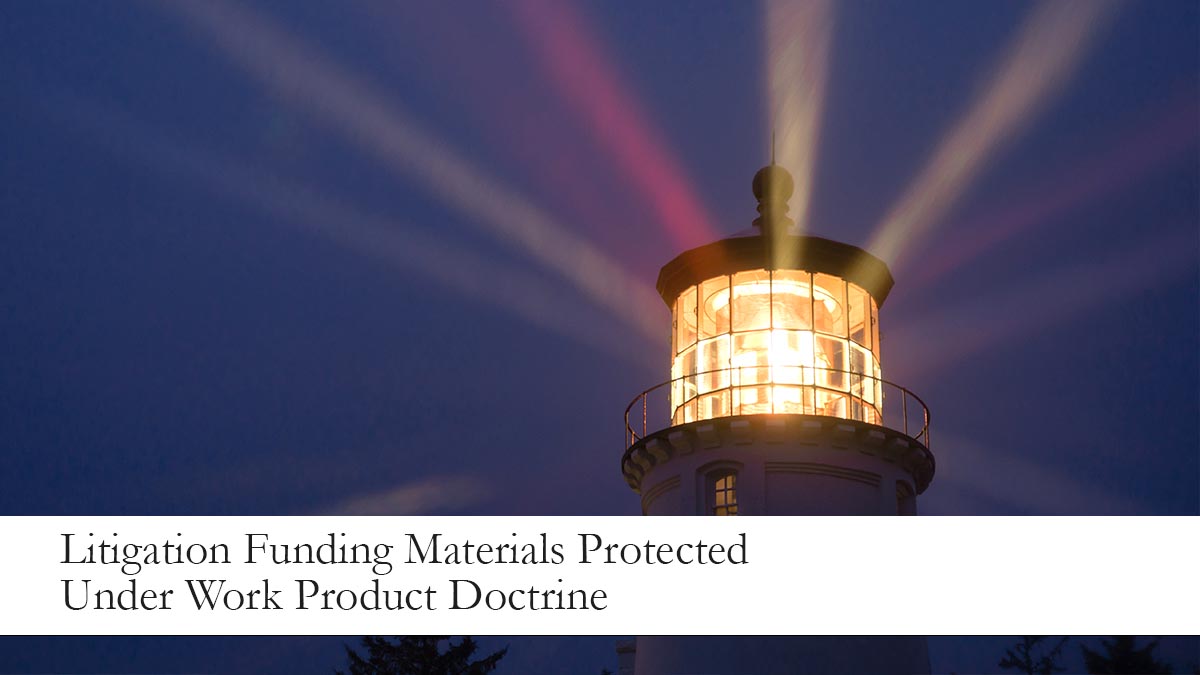November 10, 2020

Last month, Judge Bencivengo of the Southern District of California, joined an ever-growing list of federal judges around the country finding materials prepared by, for and with litigation funding entities fit squarely under the umbrella of attorney work product protection and thus cannot be disclosed to an adversary during litigation. Impact Engine, Inc. v. Google LLC, Case No. 3:19-cv-01301, Dkt. No. 129 (S. D. Cal. Jul. 17, 2019).
At its core, the work product protection shields from an adversary materials prepared in anticipation of litigation by a party or its representatives (including its counsel). Litigation funders rely on this protection in order to be able to conduct their business, which involves assessing the merits of a litigation so that it can make an informed decision about whether to invest money to support a claimant. Most courts have denied discovery into funding documents, usually on the ground that the case materials are protected by the work product doctrine (or, alternatively, that the materials are not relevant and thus fall outside the scope of discoverable subject matter).
The Imagine Engine court reviewed in camera materials submitted by the claimant, Impact Engine, including a non-disclosure agreement, a litigation funding agreement, along with drafts of that agreement, term sheets and a memo discussing the case. The court determined that these documents were all “prepared or obtained because of the prospect of litigation,” and thus can be shielded from discovery under the work product protection.
The court further held that the protection had not been waived when the documents were provided to the litigation funder. The parties entered into a non-disclosure agreement and, by virtue of their relationship, share a common interest in the success of the litigation. In exchanging the documents with its funder, Impact Engine in no way increased the chances of the documents getting into the hands of Google, its adversary in the litigation.
This decision is a good reminder to always read to the end of a story. In August, Magistrate Judge Butcher concluded—in a decision affirmed by Judge Bencivengo, but in conflict with the decisions of many other courts—that the plaintiff’s funding documents were relevant to the issues in the case, and thus were discoverable subject matter. But the court reserved the question whether the documents were nevertheless shielded by the work product protection—and it has now reaffirmed that the work product protection shields funding documents from discovery. All’s well that ends well!
Impact Engine sued Google in July 2019 for infringing its 2005 digital advertising patents. Impact Engine is a technology company that provides online rich media advertising for its clients. Its invention enabled advertisers to reach ad viewers with a media-rich advertisement containing messaging and content tailored to that individual. This technology has become known in the advertising industry as “Programmatic Creative.” Impact Engine alleges that it met with Google several times early on, at Google’s invitation, and shared its technology in anticipation of a business venture. In the end, Google severed the relationship and replicated the technology without Impact Engine. The case has been proceeding forward relatively quickly after having survived a motion to dismiss in December 2019; a claim construction hearing was held the day after the Court issued this order.